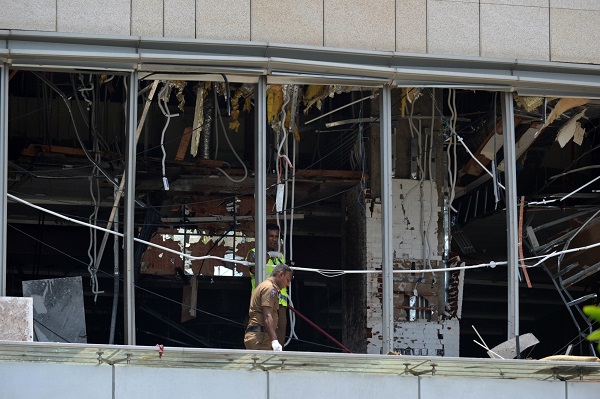
Colombo, Catholics in the Sri Lankan cities of Colombo and Negombo, where churches were targeted by suicide bombers on Easter Sunday, held their first Sunday masses since the attacks which brought the country to a standstill and claimed more than 250 lives.
The religious services were held under heavy security with armed guards and police officers standing outside every church. Separate security teams, comprising parish members and police, checked the identities of people.
Those attending masses underwent full-body searches and were banned from bringing bags. Roads were barricaded and guarded by soldiers, the Guardian reported.
The April 21 attacks targeted three luxury hotels, three churches and two other locations. The killings were blamed on local Islamist group National Thowheed Jamath, which is believed to have links with the Islamic State (IS) that claimed the bombings.
Archbishop of Colombo Cardinal Malcolm Ranjith had cancelled the mass for two weeks due to security concerns following the carnage.
Although the government assured the safety of people and promised action against those who had neglected their duties in taking the steps that could have prevented the last month’s attack, Cardinal Ranjith said he was far from satisfied.
While addressing the memorial service in St. Lucia’s Cathedral for victims of St. Anthony’s Church in Colombo, Cardinal Ranjith said both officials and politicians responsible for the attack should be punished.
At Mother of Seven Sorrows Mater Dolorosa Church, two streets away from St. Anthony’s, devotees trickled in until the building was full.
There were many who didn’t feel safe enough to come to church.
“It was our safe place. During the times of insurrections in the past, during the time of war, we always ran to the church for protection, the terrorists then didn’t attack churches. But this time they attacked the very place we run for safety,” said a tearful Chani Salgado who experienced the horror of the Easter Sunday blasts.
Despite her fears, Salgado came to Dolarosa Church. But her 13-year-old son doesn’t want to come to church yet. “He told me, ‘ammi (mom) if something happens don’t look for others, they will find their way, you come out, ok’. It broke my heart,” Salgado told Efe news.
Father Fernando Marcelliar, who led the service at Dolarosa Church, said: “The parishioners were really upset that we didn’t have a mass the last two weeks.”
More than a dozen children in the congregation were having counselling. “One mother told me yesterday that her son of eight years gets excited even by the slightest noise and doesn’t sleep well at night,” he said.
The masses in the two cities — services elsewhere in the country had restarted earlier — were small steps towards the resumption of normal life.
A heavy police and army presence is still visible in major cities as security forces continue the hunt for accomplices of the terror cell that carried out the bombings.
Sri Lankan authorities say most of the 150 people suspected to have been linked to the plot have died or been arrested.
President Maithripala Sirisena had said 56 had been arrested on suspicion of direct involvement in the plot, of which 12 were hardcore terrorists.









